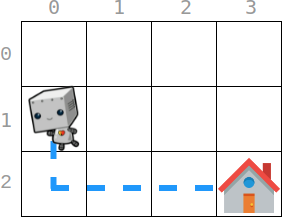2087. 网格图中机器人回家的最小代价
题目描述
给你一个 m x n 的网格图,其中 (0, 0) 是最左上角的格子,(m - 1, n - 1) 是最右下角的格子。给你一个整数数组 startPos ,startPos = [startrow, startcol] 表示 初始 有一个 机器人 在格子 (startrow, startcol) 处。同时给你一个整数数组 homePos ,homePos = [homerow, homecol] 表示机器人的 家 在格子 (homerow, homecol) 处。
机器人需要回家。每一步它可以往四个方向移动:上,下,左,右,同时机器人不能移出边界。每一步移动都有一定代价。再给你两个下标从 0 开始的额整数数组:长度为 m 的数组 rowCosts 和长度为 n 的数组 colCosts 。
- 如果机器人往 上 或者往 下 移动到第
r行 的格子,那么代价为rowCosts[r]。 - 如果机器人往 左 或者往 右 移动到第
c列 的格子,那么代价为colCosts[c]。
请你返回机器人回家需要的 最小总代价 。
示例 1:
输入:startPos = [1, 0], homePos = [2, 3], rowCosts = [5, 4, 3], colCosts = [8, 2, 6, 7] 输出:18 解释:一个最优路径为: 从 (1, 0) 开始 -> 往下走到 (2, 0) 。代价为 rowCosts[2] = 3 。 -> 往右走到 (2, 1) 。代价为 colCosts[1] = 2 。 -> 往右走到 (2, 2) 。代价为 colCosts[2] = 6 。 -> 往右走到 (2, 3) 。代价为 colCosts[3] = 7 。 总代价为 3 + 2 + 6 + 7 = 18
示例 2:
输入:startPos = [0, 0], homePos = [0, 0], rowCosts = [5], colCosts = [26] 输出:0 解释:机器人已经在家了,所以不需要移动。总代价为 0 。
提示:
m == rowCosts.lengthn == colCosts.length1 <= m, n <= 1050 <= rowCosts[r], colCosts[c] <= 104startPos.length == 2homePos.length == 20 <= startrow, homerow < m0 <= startcol, homecol < n
解法
方法一:贪心
设机器人当前位置为 \((i, j)\),目标位置为 \((x, y)\)。
- 如果 \(i \lt x\),则机器人往下移动,代价为 \(rowCosts[i + 1] + rowCosts[i + 2] + \cdots + rowCosts[x]\)。
- 如果 \(i \gt x\),则机器人往上移动,代价为 \(rowCosts[x] + rowCosts[x + 1] + \cdots + rowCosts[i - 1]\)。
- 如果 \(j \lt y\),则机器人往右移动,代价为 \(colCosts[j + 1] + colCosts[j + 2] + \cdots + colCosts[y]\)。
- 如果 \(j \gt y\),则机器人往左移动,代价为 \(colCosts[y] + colCosts[y + 1] + \cdots + colCosts[j - 1]\)。
时间复杂度 \(O(m + n)\),空间复杂度 \(O(1)\)。其中 \(m\) 和 \(n\) 分别为 \(rowCosts\) 和 \(colCosts\) 的长度。
1 2 3 4 5 6 7 8 9 10 11 12 13 14 15 16 17 18 19 20 | |
1 2 3 4 5 6 7 8 9 10 11 12 13 14 15 16 17 18 19 20 21 22 23 24 25 26 | |
1 2 3 4 5 6 7 8 9 10 11 12 13 14 15 16 17 18 19 | |
1 2 3 4 5 6 7 8 9 10 11 12 13 14 15 16 17 18 19 20 21 22 | |



